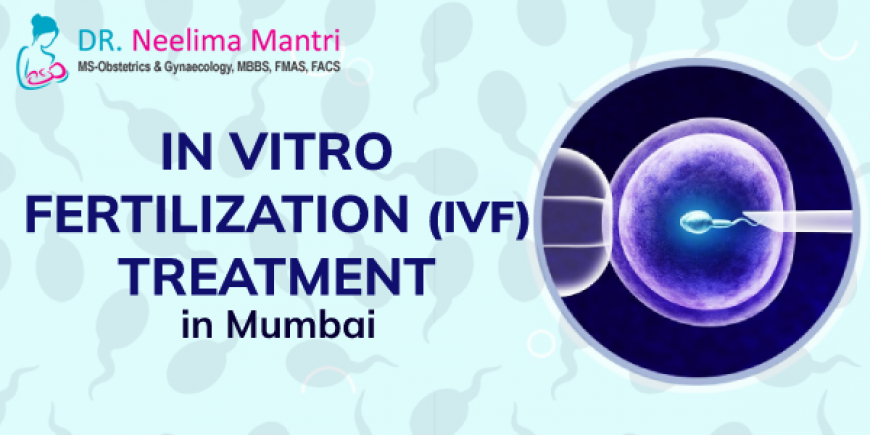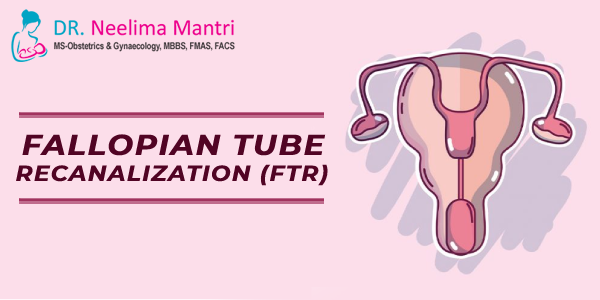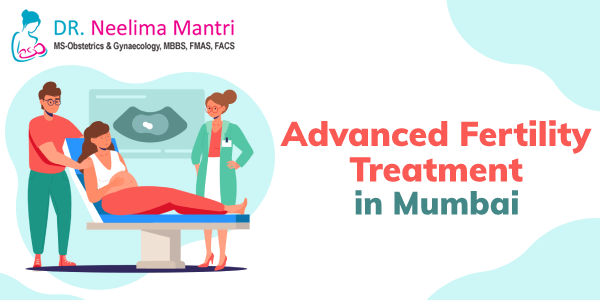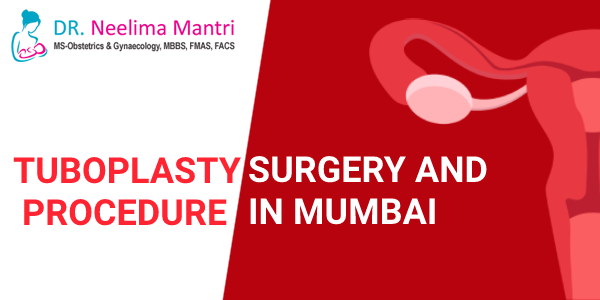
by Dr Neelima Mantri | Nov 2, 2021 | Infertility Treatment
Couples who are falling short of natural conception even after trying out treatment plans no longer have to worry about their parenthood. Today, gynaecologists are equipped with powerful procedures using Assisted Reproductive Technology (ART) that can help parents realize their parenthood.
Out of all the advanced procedures available and Ovulation Induction is the simplest procedure that can help the couple trying to conceive. But what is Ovulation Induction? How it performed and what is are the chances of conception with Ovulation Induction? With the help of the top gynaecologist in Mumbai, Dr Neelima Mantri, We answer all your question in this blog here. Read on:
What is Ovulation Induction?
Inducing ovulation through medications to increase the chances of successful fertilization is called Ovulation Induction.
Why is Ovulation Induction performed?
Regular ovulation is the release of the mature egg every 28 days in general. The interval of 21 to 35 days is considered normal, but the release of an egg sooner or later in this interval is generally considered abnormal.
More women suffer inconsistent and irregular periods (later than 35 days) and suffer fertility problems. On average 25 to 30% of the infertility problems are due to inconsistent and irregular ovulation for women who undergo infertility treatment in Mumbai.
The goal of Ovulation Induction is to persuade and consistent release of mature for fertilization to happen effortlessly, either through natural or using assisted reproductive technology.
When is Ovulation Induction performed?
Ovulation induction is performed when the lack of ovulation or inconsistency of ovulation in a woman is the cause of the conception problems, says top infertility specialist in Mumbai, Dr Neelima Mantri.
Ovulation Induction in itself is used to induce ovulation for natural fertilization or as a first step in the process of further assisted reproductive treatments like Intra Uterine Insemination or In Vitro Fertilization.
How is Ovulation Induction performed?
Specialized hormone-based medications are used in Ovulation Induction treatments to bring a woman’s hormone profile into order to make regular and healthy ovulation possible.
This medication stack may include Insulin-sensitizing agents, Aromatase inhibitors, Gonadotropins or medications like Clomiphene citrate. “Sometimes these medications are not even needed, regular ovulation can be achieved just by treating inherent health problems like obesity or hypothyroidism” top gynaecologist in Mumbai Dr Neelima Mantri.
Who is suited better for Ovulation Induction treatment?
As mentioned earlier, women who experience irregular ovulation are commonly benefitted from Ovulation Induction treatment procedures. The gynaecologist first takes inherent gynaecological problems suffered by women into account and devise a treatment plan based on the cause of irregular ovulation.
Are there are any side effects for Ovulation Induction?
In very rare cases women may experience side effects that may include bloating, nausea, headaches, hot flashes and pelvic tenderness. But Incidence of these symptoms is rare. Every year thousands of women in Mumbai made use of the Ovulation Induction to realize their parenthood dream. With the right gynaecological you can too.
If you are in Mumbai and are facing fertility problems that are keeping you away from becoming a parent then Dr Neelima Mantri is the best gynaecologist in Mumbai who can help you. You can contact her here: +91 7045115577

by Dr Neelima Mantri | Sep 21, 2021 | Blog, Infertility Treatment
In Vitro Fertilization treatment has been a boon to childless couples for decades now. This advanced procedure helped millions of couples realize their dream of becoming parents and it continues to do so. While the exposure for this advanced reproductive treatment option is has been considerably less in the last decade, it is slowly picking up in this one.
Especially in Metros like Mumbai, IVF has become a go-to reproductive procedure for a couple who do not have success with natural conceptions methods. If you are in a similar boat and are looking for IVF treatment in Mumbai, then this blog is for you. With the help of Dr Neelima Mantri, one of the top gynaecologists in Mumbai we aim to give a sneak peek into the procedure to improve your awareness about IVF Treatment in Mumbai. Read on:
What is the IVF procedure? How does it work?
In vitro Fertilization is an advanced reproductive procedure that removes all the hurdles a sperm and egg face to reproduce an offspring. In a series of steps, the mature eggs are collected and are fertilized with sperm in a closely controlled laboratory environment to develop an embryo. This embryo is inside the womb of a woman.
IVF is usually performed with the couple’s eggs and sperm but it can also be performed with donor sperm if the need arises. In some cases, a gestational carrier can also be used to implant the embryo in case the mother’s health condition is not suitable. IVF treatment in Mumbai usually is a 3-week cycle that can be extended if the steps are split into batches. The chances of having a healthy baby are significantly increased with IVF. Also, it is important to note that chances of pregnancy and its health also depend upon the couple’s age, cause of infertility and also health history in few cases.
In addition to infertility, fallopian tube blockage, Endometriosis, Uterine fibroids, impaired sperm function or production, genetic disorders are other common health conditions where IVF can be of great help when it comes to helping couples realize their parenthood dream.
Know the procedure and the journey beforehand:
While IVF treatment can be effective it can also be long and tedious which is why the couple must know everything about the procedure and also other options. For example, IVF is not the only available artificial reproductive procedure available, there are other options like IUI and ICSI too.
So if you are planning for IVF, it is in your best interest to run down all the options, assess best and worst cases, check out case studies in either of spectrums, take a second opinion and have realistic expectations before starting the journey. Also IVF treatment can be an expensive procedure
If you are in Mumbai and are looking for In vitro fertilization treatment in Mumbai, Dr Neelima Mantri is the best laparoscopic surgeon in Mumbai who can help you. A top gynaecologist in Mumbai and also the best laparoscopic surgeon, Dr, Neelima Mantri has helped hundreds of couples realize their parenthood dream with advanced reproductive treatment procedures like IVF, IUI, & ICSI. You can contact her here: +91 7045115577

by Dr Neelima Mantri | Jul 16, 2021 | Blog, Infertility Treatment
For a woman to get pregnant, the sperm needs to meet the egg. But what if the tube known as the fallopian tube, which helps in carrying the woman’s egg to her uterus, is blocked? That is when the problem of getting pregnant arises because the process of fertilization will not take place. That is when a fallopian tube recanalization is needed.
What are the fallopian tubes?
Every month, a woman’s ovary releases an egg that travels down to the uterus where, if the egg meets the sperm and is fertilized, a baby will grow. This egg travels from the ovary to the uterus with the help of tubes known as the fallopian tubes. The sperm travels to the egg with the help of the fallopian tubes. These tubes play a very important role in the fertility of every woman.
What is fallopian tube recanalization?
Since the traveling of eggs is done with the help of the fallopian tubes every month, any kind of blockage in these tubes will lead to a very hard time getting pregnant. The chances of getting pregnant would come down to 0% altogether.
Causes for the blockage of a woman’s fallopian tubes can be a build-up of debris that is unwanted or scarring from surgery or a serious infection. That is when a woman needs to go to a doctor for a fallopian tube recanalization (FTR). It is a nonsurgical procedure that helps in clearing any kind of blockage in the fallopian tubes which plays a major role in the pregnancy of a woman.
What is the procedure?
The procedure does not take a lot of time and might be wrapped up within half an hour. The half an hour of the procedure includes getting the equipment ready, cleaning the patient’s skin, and unblocking the tubes. It is done under sterile conditions to avoid any kind of infection from getting developed. The procedure does not require needles or cuts. The steps are:
> A speculum is placed into the vagina and a catheter is passed into the uterus through the cervix.
> Then a liquid contrast agent is injected into the uterus with the help of the catheter.
> The doctor will then carefully examine the uterine cavity with the help of an X-ray camera.
> They will take out a picture of the patient’s uterus and fallopian tube.
> They will then determine if there is any kind of blockage in the fallopian tubes and if the blockage is only one or both of the tubes.
> The doctor will then insert a smaller catheter through the first catheter which was bigger, into the fallopian tubes. With the help of this, all the blockage will be cleared away.
Conclusion
If anybody living in Mumbai is looking for an Infertility Specialist In Mumbai, they need to get in touch with Dr Neelima Mantri as soon as possible, as she is currently the best Female infertility doctor in Mumbai. Dr Neelima Mantri helps her patients out with the best treatments and solutions.

by Dr Neelima Mantri | May 18, 2021 | Blog, Infertility Treatment
Fertility difficulties result in complicated pregnancy or no pregnancy at all. Infertility issues may arise from a complication of either the male or the female partner or both. To cure such problems or find alternative ways, the fertility specialist in Mumbai suggests advanced fertility treatments that help hopeful mothers to conceive and give birth to a healthy baby.
There are several processes like medicinal, surgical, or assisted conception, that can be experimented with to treat infertility. Treatments like IVF, ICSI, etc. are proven to be quite effective in helping willing parents to get pregnant.
Advanced Infertility Treatments:
There are 3 types of fertility treatment in Mumbai. Let us learn about the treatments.
1. Medicines
The first stage of treatment is done by medicines. If the issue is minor, specialists suggest medicines. Here are the commonly used medicines.
- Clomifene- This helps in ovulation if a woman doesn’t ovulate monthly or at all.
- Tamoxifen- This is used for the same purpose as clomifene.
- Metformin- This is prescribed to women having polycystic ovary syndrome.
- Gonadotropins- This not only encourages ovulation but may cure infertility problems in men as well.
These medications may show some side effects and therefore, you must consult a gynecology doctor in Mumbai before taking such medicines.
2. Surgery
Various surgery options are there to treat infertility problems depending on the condition. Let us learn briefly about the common surgeries.
- Fallopian Tube Surgery– Blockage or damage in the fallopian tube is a common condition that prohibits uninterrupted egg flow. This damage can be repaired with surgery. However, a fertility specialist in Mumbai suggests that the surgery may increase the risk of ectopic pregnancy.
- Laparoscopic surgery– This surgery can cure conditions like endometriosis, fibroids, and polycystic ovary syndrome by removing cysts and using ovarian drilling to initiate ovulation.
- Retrieving sperm surgery– Epididymal blockage can prevent sperm from ejaculation. Such infertility issues in men can be cured with surgery.
3. Assisted Conception
A fertility doctor in Mumbai suggests three options of assisted conception.
- In Vitro fertilization (IVF)- One of the common and successful methods is to extract eggs from the ovaries and fertilize them with sperms in a laboratory. The embryo is then placed in the womb where it grows to a baby. For increased egg production, fertility medicines are often prescribed to the mother.
- Intrauterine insemination (IUI)– In this procedure, the best quality sperms are washed and selected. Then using a thin tube, the sperms are inserted through the cervix to the womb.
- Donation of sperm and egg– If parents are having severe infertility issues, they may receive eggs or sperms from registered donors. The process of IVF is then followed to encourage fertilization. Make note that the donor can’t donate anonymously.
Dr Neelima Mantri, a renowned gynecology doctor in Mumbai, not only treats conventional gynecological problems but has expertise in treating infertility triumphantly. She has done critical surgeries successfully and has many happy patients.
In case of any gynecological or infertility complications, consult Dr Neelima Mantri call: +91 70451 15577 for the best quality treatment and effective cure.

by Dr Neelima Mantri | Apr 8, 2021 | Blog, Infertility Treatment
A tuboplasty refers to a set of surgical interventions carried out when there is a blockage in the fallopian tubes of a patient. It is also carried out if the patient has had their fallopian tubes surgically ligated as a method of birth control and wants to reverse it.
Its aim basically, is to reduce all the barriers and increase the chances of getting pregnant. In this article, we will look at what exactly is tuboplasty and what is the exact procedure that it follows and how it leads to an increased chances of pregnancy in women.
The fallopian tubes in the female reproductive system connect the uterus to the ovary. They are responsible for transferring the eggs from the ovary to the uterus and are also a site for fertilization. Certain conditions however, can create blockages.
One of the causes of a blockage for instance, is an infection leading to creation of a scar tissue which blocks the fallopian tube. If there is a blockage then the egg is unable to reach the uterus thereby leading to infertility in women.
- Who Should Undergo Tuboplasty?
Women with infertility issues and who are experiencing difficulty in getting pregnant should undergo tuboplasty. Women with a blockage in their fallopian tubes should also undergo tuboplasty. Tuboplasty also increases the chances of getting pregnant when it is combined with IVF or in- vitro fertilization.
- How is Tuboplasty Performed?
Tuboplasty can be performed through a regular surgical method or through minimally invasive methods. The kind of surgery that a patient is assigned depends on the cause of the blockage and other factors that vary from patient to patient.
To decide which type of surgery should be performed, the gynaecologist or the obstetrician will resort to diagnostic imaging such as ultrasound and consider the patient’s medical history before coming to a conclusion.
- Types of Surgical Methods in Tuboplasty
- Tubal reanastomosis- In this method, the damaged tissues are cleared or re-sectioned and the remaining parts are sutured together.
- Fimbrioplasty- This method involves reconstruction of the fimbria that allows the eggs to enter into the fallopian tube.
- Salpingostomy- This is a minimally invasive method where only the blockage is removed and other parts of the fallopian tube are left as they are.
- Salpingolysis- In this method, the scar tissue is removed to clear the blockage in the fallopian tubes.
- Cornual implantation- This involves resectioning of the damaged portions of the fallopian tubes and reconnecting their ends to the uterus.
Conclusion
If you are looking for the best Doctor for Tuboplasty in Mumbai, Dr Neelima Mantri should be your first choice. She is a top obstetrician, gynaecologist and an infertility Specialist in Mumbai. Her experience of more than a decade in high risk obstetric cases makes her the go- to doctor for reproductive treatment in mumbai.
Her extensive training and practice in India and abroad have made her an expert in navigating cases of infertility, polycystic ovarian syndrome and ectopic pregnancies. She specializes in minimal access surgeries in addition to conventional gynaecological practice.

by Dr Neelima Mantri | Dec 22, 2020 | Blog, Infertility Treatment
Pregnancy is a very sensitive and important part in the life of a woman. Not just physically but also emotionally. Carrying a life inside you is no small task and no one feels the gravity of this commitment more than the mother.
A pregnant woman wants the best for her child but this is only possible when the premium care is taken of her during the entire process of pregnancy. Knowing about different things that can benefit the mother and child during pregnancy is an essential aspect that must be acknowledged to ensure the maintenance of a healthy lifestyle.
One such thing that can help improve the health concerns of a pregnant woman is the consumption of omega3 fatty acids. In this article, we will know the importance of omega 3 fatty acids in pregnancy. But first, let’s see what these acids are!
What are omega 3 fatty acids?
Omega 3 fatty acids also called omega-3 oils are characterized by a double bond which is three atoms away from the terminal methyl group. These acids are present in abundance in natural food sources. It is an important component of the animal lipid metabolism. It also plays an important role in the human diet and human physiology.
There are types of omega-3 fatty acids that humans need:
- ALA (α-linolenic acid) which is found in plants
- EPA (eicosapentaenoic acid) and
- DHA (docosahexaenoic acid) which is commonly found in Marine animals.
What are the benefits of omega3 fatty acids during pregnancy?
Neurology and early visual development: Research show that omega 3 oils are essential for the neurological and visual development of a fetus during pregnancy. Adding EPA and DHA is known to help with the cognitive development of a child.
Breast Milk: Omega 3 is used after birth to generate breast milk. These omega 3 reserves are further depleted as the baby drinks milk. Therefore, for the safety and well-being of both mother and child, the mother needs to take a lot of omega 3 during and after pregnancy.
Allergies: one of the benefits of taking omega 3 in pregnancy is how allergies are played out. Research suggests that omega3 reduces the chances of a baby developing allergies. If given in adequate quantities, the baby can be protected against allergies at the start of his life.
Pregnancy: Omega 3 benefits encompass pregnancy directly too. Consuming omega 3 fatty acids have been proven to reduce preterm labor and delivery. They lower the risk of preeclampsia and help in increasing body weight as well. Losing bodyweight can be very dangerous for a mother and omega 3 acids help in the prevention and control of this condition in the long run.
The best sources for omega 3 fatty acids
The benefits of taking omega 3 in pregnancy are immense. The best sources are:
- Salmon
- Mackerel
- Sardine
- Algal oil
- Sage seed oil
Omega 3 acids are not manufactured in the human body naturally. Thus, it needs to be replenished by external sources. To avail more information about the best omega 3 for pregnancy sources, be sure to seek assistance from experts such as Dr. Neelima Mantri.







